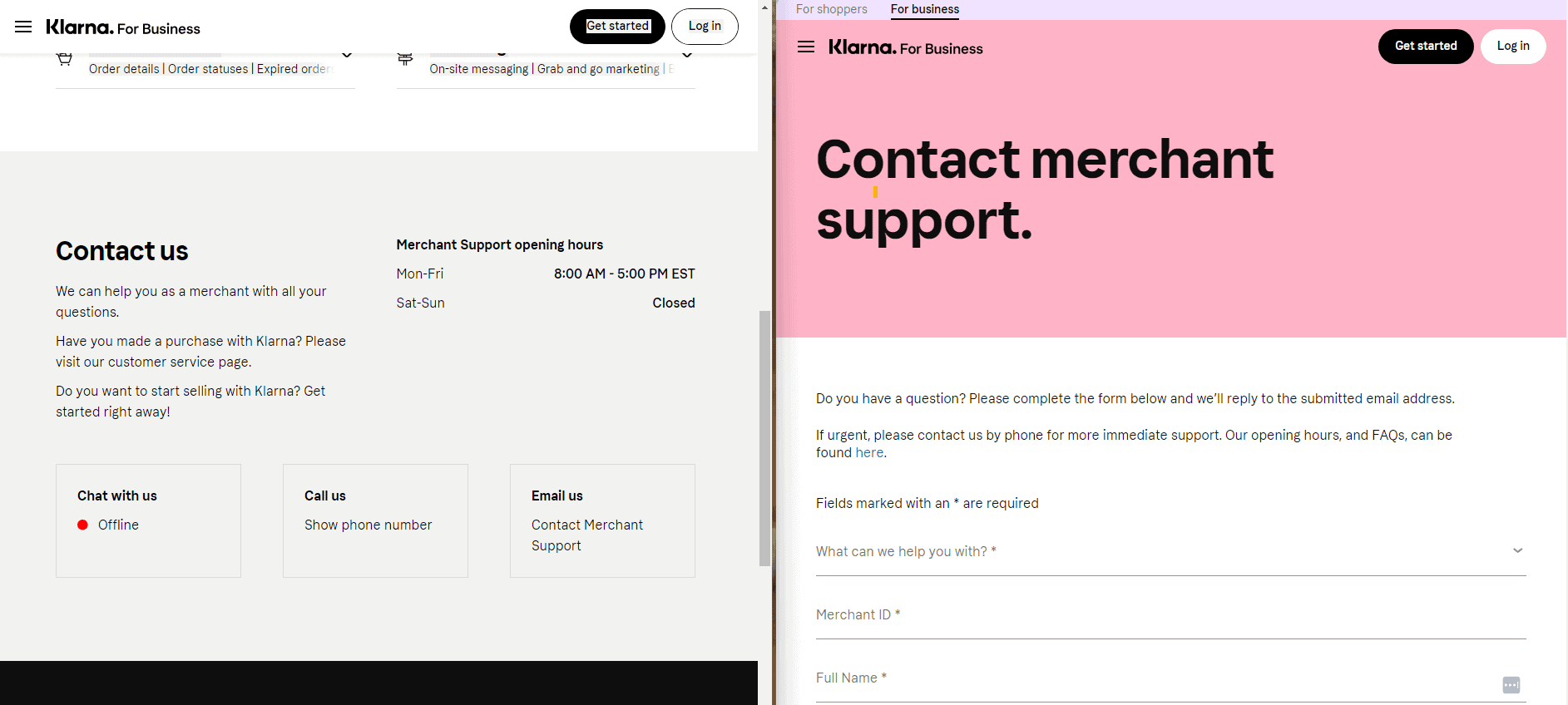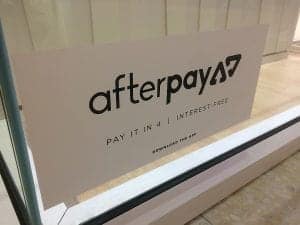Klarna is a buy now, pay later app that lets your customers access short-term, low-cost financing. Are Klarna’s merchant fees worth it? Learn about the benefits and drawbacks in this post.
Klarna is a payment option that lets shoppers extend their buying power by spreading payments over time, with no consumer fees or interest added. Adding Klarna can help you capture more sales by allowing buyers to purchase more than their budget currently allows.
Is Klarna one of the best buy now, pay later apps, and is it a good fit for your small business? Let’s find out.
What Is Klarna For Business?
Klarna is a buy now, pay later (BNPL) payment method that allows your customers to access a short-term loan financed by a third party.
BNPL options like Klarna and other customer financing programs are increasingly desirable, making purchasing easier by splitting the sales price into several equal installments.
Current buy now, pay later statistics show that BNPL is especially popular with:
- Younger consumers. About 75% of the Gen Z and Millennial cohorts use BNPL. That essentially means shoppers born after 1981.
- Big-ticket purchases. More than a third of BNPL shoppers used it to finance items costing $500+.
If your business includes selling big-ticket items to younger consumers, adding Klarna as a payment option seems like a no-brainer. Even if that doesn’t sound like you, adding Klarna can be an easy buying option for customers and a low-cost sales tool for merchants.
How Does Klarna For Business Compare?
Klarna is not the only buy now, pay later option. Here’s how it stacks up against some other popular apps.
|
Typical Merchant Fee |
Payout |
Max Loan Amount |
| Klarna |
5.99% + $0.30 |
In full, upfront |
None |
| Affirm |
5.99% + $0.30 |
1-3 days |
$25K/transaction |
| PayPal Pay Later |
3.49% + $0.49 |
In full, upfront |
$10K/transaction |
| Afterpay |
6% + $0.30 |
1-5 days |
Varies based on creditworthiness |
| Sezzle |
Not disclosed |
Around 3 days |
$2,500 |
Who Can Use Klarna For Business
With nearly half a million merchants in the U.S. offering Klarna financing, it’s easy to understand how popular this alternative payment method has become.
Among familiar merchants and big labels using Klarna, like Instacart, Tractor Supply Company, REI, Dolce & Gabbana, and Nike, you’ll also find plenty of up-and-comers selling the types of products your store offers.
Klarna requires vendors to have a registered business name. Your business must have a live website with a URL that doesn’t redirect. All your links must work with no error messages.
Additionally, your website must include this information:
- Prices on products, including transaction currency
- Product descriptions
- Terms and conditions
- Business contact details, including either an email address or phone number
- Return policy
- Shipping policy
- Estimated delivery time
The company says it returns or denies approval within about 24 hours.
Klarna is available in 19 countries besides the US, including Australia, Great Britain, Switzerland, and numerous European Union nations.
Is Klarna Good For Business?
Here are some of the benefits you may see when you add Klarna as a payment option:
- Shoppers Love Payment Options: Because Klarna is an addition to your payment menu and doesn’t replace more traditional methods, it should be seen as a benefit for those who want to use it. Klarna is especially attractive to younger shoppers, who may not have high credit card limits or sufficient cash flow to pay in full upfront.
- Order Sizes Increase: Klarna says merchants typically see a 41% increase in average order value after they add the BNPL payment method.
- Secure Transactions Build Trust: Klarna offers consumers one-click transactions. Though they’ll provide their credit or debit card information to Klarna, they won’t have to enter it on every website they want to buy from. That should make them more comfortable doing business with you, especially for first-time customers.
How Klarna Makes Money
Klarna offers interest-free short-term loans to shoppers. But it has to make money somewhere, and that leaves you, the seller, to make up the difference.
If you offer Klarna as a payment option, you’ll pay a portion of each sale you make to Klarna. The calculation you must make is whether the increased order size will make up for the additional charges you will incur on transactions processed using Klarna.
Expect to pay a percentage of each sale plus a flat per-transaction fee. In exchange for these fees, you extend your customers’ buying power without taking on any financial risk of your own. You’ll be paid in full after the sale processes, and you stand no financial risk if the customers don’t pay Klarna back.
What Are Klarna Merchant Fees?
Klarna pricing for merchants is opaque. In fact, I found it extremely difficult to verify pricing, with many pages inaccessible or “being updated.” I attempted to use the chat function online but learned that it’s limited to current customers.
What’s more, when I tried to send an email, as directed, the link sent me to a form that required a merchant ID number to continue, which was frustrating.

Screenshot of Klarna webpages, captured 10/18/2023
However, I did find a phone number and was able to connect after a short hold with a helpful Klarna rep. She let me know that most merchants will pay a flat fee of 5.99% + $0.30 per transaction. Following a sale, merchants can expect to see a direct deposit of the full purchase amount minus these fees.
That’s a change from the past when merchant fees depended on the type of financing customers requested.
Keep in mind that all Klarna fees include credit card processing fees, which would typically cost you around 2.9% of each transaction from many of the best credit card processing companies. However, the Klarna rep did let me know that some vendors may see additional fees from their sales platform. (She specifically mentioned Shopify, probably because of the transaction fees added to that platform for some sellers.)
The rep also let me know that sellers with annual revenues topping $5 million may be able to negotiate lower fees based on their sales volume. Interestingly, these sellers can also negotiate a higher rate to secure lower Klarna fees for their customers.
Klarna says there are no joining or ongoing monthly fees for sellers, only the per-transaction fees mentioned above. Furthermore, the fee structure will be discussed in detail during Klarna’s onboarding process with new merchants.
How Klarna Works for Customers
From the perspective of customers, Klarna is an attractive option. Shoppers can take out a short-term loan with just a soft credit check that doesn’t nick their credit rating.
Consumers who use Klarna to spread out their payments over time at partner merchants essentially activate a revolving line of credit. It’s similar to using a credit card, but instead of having an open line of credit, each transaction is judged at the point of sale.
Once consumers have opened a Klarna account, they can apply for payment plans by entering minimal personal information at the point of sale. Klarna almost instantly sifts through publicly available credit information after consumers enter their email and ZIP Code.
Some consumers will pay Klarna interest on their purchases, although the majority are offered as no-interest options — provided the buyer makes payments on time and pays in full within the agreed-upon time frame.
Shoppers can choose to pay in four interest-free installments, charged every two weeks for a total term of six weeks. Klarna also offers interest-free 30-day financing as well as longer-term financing up to 36 months available with an interest rate between 7.99%-29.99%.
Klarna also offers a customer loyalty program, Vibe, that allows users to earn reward points they can redeem for gift cards and special offers. A buyer protection program allows shoppers to pause payment if they don’t receive their order or receive a defective item.
Shoppers can also use a Klarna One-Time Card for in-person purchases.
How To Get Started With Klarna For Business
If you’ve looked at the numbers and feel Klarna is a good option, head to the Klarna website to sign up as a partner and get started!
Offering Klarna as a payment option is simple. Sign up as a Klarna partner, then add it as a payment option at checkout, and your customers can choose what type of installment plan they want to pay for their purchases.
Klarna makes it easy by offering integrations with dozens of eCommerce platforms. Here is just a small sample of available integrations:
- Shopify
- WooCommerce
- 3dcart
- BigCommerce
- Magento Commerce
- Stripe
- Wix
- Prestashop
- Salesforce Commerce Cloud
You can also use Klarna’s API or SDK. Klarna promises marketing materials you can use to let customers know you’re offering the service.
Klarna Alternatives
Not convinced that Klarna is the right BNPL choice for your business? Take a look at three top competitors:
Klarna FAQs
How do I set up Klarna for my business?
Adding Klarna as a payment method for your online store checkout is easy. You’ll need a registered business name and a live URL for a website that doesn’t redirect. Apply online with Klarna.
How much does Klarna charge merchants?
Klarna does not disclose its merchant fees. We learned from a Klarna rep that the typical fee is 5.99% + $0.30 per transaction. Your actual fee may vary slightly and will be disclosed during the Klarna onboarding process.
What happens if people stop paying for their Klarna purchases?
Customers who stop paying or fall behind on their repayment schedule after they make a purchase using Klarna financing will find themselves the target of Klarna’s debt collection efforts. Klarna assumes the financial risk and the responsibility of collecting repayment. Sellers who add Klarna as a payment option for customers will be paid in full after sales are processed and don’t carry any of the financial risk.













